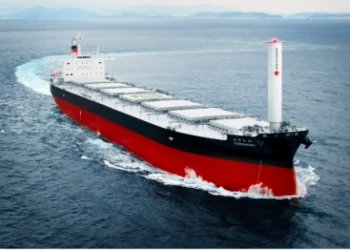Scientists are able to understand the consequences of increases in greenhouse gases
 New research from the University of Missouri indicates that Atlantic Ocean temperatures during the greenhouse climate of the Late Cretaceous Epoch were influenced by circulation in the deep ocean. These changes in circulation patterns 70 million years ago could help scientists understand the consequences of modern increases in greenhouse gases.
New research from the University of Missouri indicates that Atlantic Ocean temperatures during the greenhouse climate of the Late Cretaceous Epoch were influenced by circulation in the deep ocean. These changes in circulation patterns 70 million years ago could help scientists understand the consequences of modern increases in greenhouse gases.
“We are examining ocean conditions from several past greenhouse climate intervals so that we can understand better the interactions among the atmosphere, the oceans, the biosphere, and climate,” said Kenneth MacLeod, professor of geological sciences in the College of Arts and Science.
“The Late Cretaceous Epoch is a textbook example of a greenhouse climate on earth, and we have evidence that a northern water mass expanded southwards while the climate was cooling.
At the same time, a warm, salty water mass that had been present throughout the greenhouse interval disappeared from the tropical Atlantic.”
The study found that at the end of the Late Cretaceous greenhouse interval, water sinking around Greenland was replaced by surface water flowing north from the South Atlantic.
This change caused the North Atlantic to warm while the rest of the globe cooled. The change started about five million years before the asteroid impact that ended the Cretaceous Period.
To track circulation patterns, the researchers focused on “neodymium,” an element that is taken up by fish teeth and bones when a fish dies and falls to the ocean floor. MacLeod said the ratio of two isotopes of neodymium acts as a natural tracking system for water masses.
In the area where a water mass forms, the water takes on a neodymium ratio like that in rocks on nearby land. As the water moves through the ocean, though, that ratio changes little.
Because the fish take up the neodymium from water at the seafloor, the ratio in the fish fossils reflects the values in the area where the water sank into the deep ocean. Looking at changes through time and at many sites allowed the scientists to track water mass movements.
While high atmospheric levels of carbon dioxide caused Late Cretaceous warmth, MacLeod notes that ocean circulation influenced how that warmth was distributed around the globe. Further, ocean circulation patterns changed significantly as the climate warmed and cooled.
“Understanding the degree to which climate influences circulation and vice versa is important today because carbon dioxide levels are rapidly approaching levels most recently seen during ancient greenhouse times,” said MacLeod.
“In just a few decades, humans are causing changes in the composition of the atmosphere that are as large as the changes that took millions of years to occur during geological climate cycles.”
Source: Terra Daily



























































